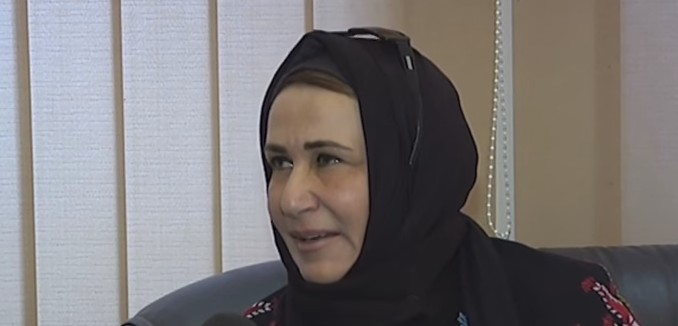A Palestinian legislator from Nablus is presenting an “unprecedented” challenge to Palestinian Authority President Mahmoud Abbas and the PA’s rampant corruption, according to a report by Jonathan Schanzer and Grant Rumley published Monday in The Daily Beast. Schanzer and Rumley are respectively the vice president for research and a research fellow at the Foundation for Defense of Democracies.
Najat Abu Bakr’s ordeal began in February when she accused Hussein al-Araj, a PA minister and political ally of Abbas, of skimming $200,000 from a deal he was involved in. The charge was denied by Al-Araj, according to Al-Monitor, and led the PA to start pursuing Abu Bakr.
“The Palestinian Authority leadership, widely recognized as a cesspool for corruption and for stifling criticism against the government, issued an arrest warrant shortly after her accusations,” wrote Schanzer and Rumley. “Abu Bakr then fled to the safety of the parliamentary building to avoid arrest. She has since turned over files documenting purported evidence of Araj’s case and other high-level corruption to the PA’s anti-corruption czar and the Fatah party head in parliament. It is still unclear whether her charges will ever be acknowledged or addressed.”
This isn’t the first time Abu Bakr has accused PA leadership of corruption. In 2013, she accused then-PA prime minister Salam Fayyad, a man with a reputation for fighting corruption, of improperly using funds to pay his security detail. She criticized Fayyad’s successor, Rami Hamdallah, the following year for placing restriction on labor unions. She also accused the PA’s foreign minister of nepotism when he appointed an ambassador who was tainted with allegations of corruption.
While it isn’t unusual for Palestinian politicians to make anti-corruption a cause, they don’t often present documentation of the charges as Abu Bakr did. Abu Bakr’s case is also unusual because the last PA official to flee to a government building to escape arrest was Yasser Arafat, who was cornered by Israeli troops in his presidential palace during the violence of the second intifada.
The PA has been accused of corruption since its establishment in 1994. The International Monetary Fund found that from 1995 to 2000, Arafat diverted $900 million in aid to a special bank account, while PA leadership had transferred $300 million to Swiss accounts between 1997 and 2000.
The corruption hasn’t stopped since Abbas succeeded Arafat. An EU investigation found that more than $3 billion was “mismanaged” by the PA from 2009 to 2013.
The results of the corruption have been severe. Hamas won the 2006 legislative elections at least in part by campaigning as a transparent alternative to the corruption endemic in the PA. This boosted Hamas’s political strength. International aid has also taken a hit, with Reuters reporting that contributions from the EU to the PA have dropped from $1.3 billion annually to $700 million. According to Hamdallah, foreign donations to the PA have dropped 43% since 2011.
The cash shortfall has led to a crisis in the government, which has been unable to meet a 2013 promise to raise teachers’ salaries, leading to an ongoing teachers’ strike against the PA.
According to a 2014 poll cited by Schanzer and Rumley, some 94% of Palestinians believe that the PA is corrupt. Two potential successors to Abbas, Jibril Rajoub and exiled former security chief Mohammad Dahlan, have campaigned against the PA’s corruption. Dahlan has even filed a lawsuit against Abbas in 2013, charging that “the Palestinian Authority and its leadership are tainted by corruption on a grand scale.” Rajoub has called for a “balance of power through free democratic elections.”
Schanzer and Rumley conclude:
Rajoub’s calls resonate on the Palestinian streets for a reason. Abbas is now eleven years into his four-year term. The corruption is as much political as it is financial. It was the toxic combination that ultimately prompted millions to take to the streets in of Arab capitals in the chaotic Arab Spring protests. The Palestinians have, until now, eluded such a crisis. But as Najat Abu Bakr’s sit-in demonstrated, the need for reform remains dire. What will it take for Washington to notice?
Rumley examined Abu Bakr’s case last month while the parliamentarian was still evading arrest.
Two weeks ago, veteran Arab affairs correspondent Khaled Abu Toameh contrasted the treatment Abu Bakr received at the hands of the PA for trying to expose corruption to the protection afforded to member of Knesset Hanin Zoabi by Israel.




